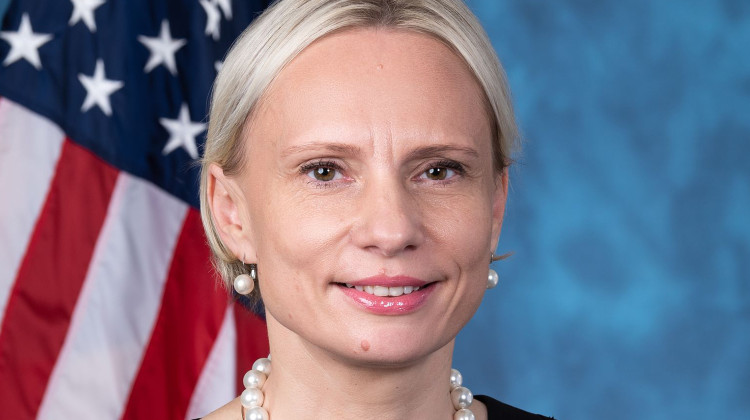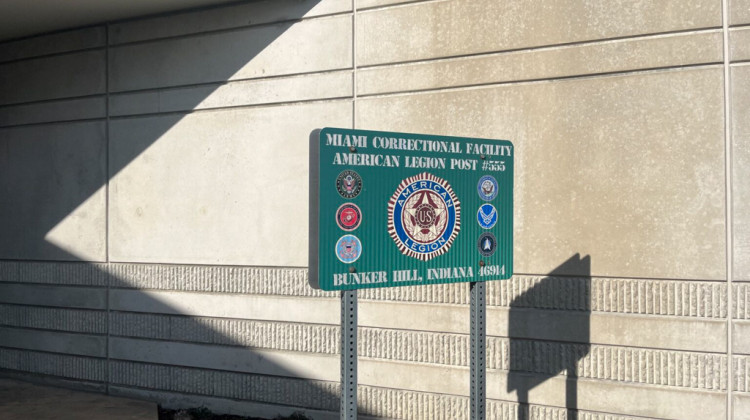
Victoria Spartz was born in Ukraine. She has a background as a CPA and small business owner. She served as an Indiana State Senator and was first elected to represent Indiana’s District 5 in 2020.
Photo from IN.govWFYI is speaking with U.S. House of Representatives candidates running for election in Central Indiana.
Republican Victoria Spartz is running for office in the 5th Congressional District, which represents parts of Hamilton, Madison and Howard County. She faces Democrat Deborah Pickett, Libertarian Lauri Shillings, and Independent Robby Slaughter.
Spartz was born in Ukraine. She has a background as a CPA and small business owner. She served as an Indiana State Senator and was first elected to represent Indiana’s District 5 in 2020.
WFYI’s Jill Sheridan talked to Spartz to discuss why she’s running for the seat.
This transcript has been lightly edited for clarity and style – this candidate also has an accent and we have edited for clarity of meaning. WFYI fact checks all candidate interviews and provides editor’s notes in the audio and digital publications.
Jill Sheridan: Thank you so much, Congresswoman Spartz for joining me today and chatting about this election here in District 5. If you could talk a little bit about why you're running, I guess in this case, for re-election in District 5.
Victoria Spartz: Well, I feel this is a very challenging, very important time for our country, and there are a lot of issues being neglected by Congress for a long time, but we need to start governing. So I've been working very hard to make my party govern, but make sure that we have some common sense. And as you know, there is no lobby for the people in Washington to see where they own the lobby. So we need to remember that and start dealing with issues.
So we have fiscal issues, our debt is a ticking bomb. We have border security issues. We have an instability around the world. And I think we need to start delivering. And I feel that I need to make sure that I'll deliver for the people on some big promises and reforms, and I hope we'll have a better alignment of the stars, from my perspective, after November, that I can have more allies in Washington, DC to get things done.
Sheridan: I guess that question is slightly unique to you as well. Are those the issues that really brought you back into this race?
Spartz: Yeah, and I think one of the things, and I'll be honest with you, as a CPA, someone who spent big part of my life and finances, I was very, maybe at the beginning of my political endeavor, I was a little bit surprised how little of finance work we're doing where we actually should be fiscal, besides that should be number one job, you know. But I feel that is a conversation that I have a lot of expertise. I know enough to be dangerous, but actually can claim, you know, expertise. I work in a real world and get paid money in finances and accounting, and I feel we really, really need to deal with these issues.
And I've been pushing a lot of reforms, including in healthcare, which is maybe not very, you know, sexy issue to discuss, but it is extremely important for a lot of Americans, and particularly for Indiana, because Indiana has some of the worst numbers on insolvencies, on medical debts, on prices of healthcare, and really the competition for value. So we need to really step up and get things done.
Sheridan: What would you say is the most important issue facing voters in District 5 today?
Spartz: Well, I think it's the economy, we need to really have growth in economy. Because if we have growth in economy, it makes you know, more opportunities for the people you know, for normal Americans to be able to, you know, provide for the families, for kids to build their future, to pursue their happiness. If we [do] not have a strong economy, we will not be able to deliver and help people that we need to help, most Americans [will] not be able to advance in life.
And I think what's happening right now, it's not very good economy and inflation and levels of spending created a lot of problems for people, for normal Americans that you know that have to go to the grocery store and pay for food and try to figure out how to pay for the kids education, how to try to figure out how they can buy a house and have a house to live in. So this is a huge problem. I had town halls around the district, and economy is probably number one issue, and then followed by problem border security, that is also, you know, national security issues and some other issues, probably a lot of them even not federal but state.
Sheridan: And strongly linked to the economy, as you mentioned, you know, housing, it is becoming more unaffordable for people in many areas across District 5. We see that happening in a lot of these suburban areas. What measures or moves do you think could really improve options for people?
Spartz: Well, I think it's a combination, but a lot of this issue is also state and local, and we actually cannot get state and local governments off the hook. You know, I used to be state senator and I always tell my constituents I can lobby for you also in the state house, you know, to make sure that my colleagues are doing a good job, because I have responsibilities as a former state senator, that we as a state are doing a good job.
So I think it's a combination we have to think about our property taxes, what's happening and a lot of distortions and being neglected, and now we have huge increases which are going to make more and more housing unaffordable. We have to think about all of these regulations, and this is a combination of federal, state and local and fees, you know, and the development that takes so much money to do that, but in some of the things driven by federal policies, which is really leading to inflation and increasing prices too in a lot of you know, supplies and a lot of materials to cost to build the homes, including bad energy policy, actually, complete lack of energy policy.*
It's all politics which drives inflation. We have challenges with supply chain, where we let China manipulate supply chain and spending printing money causes inflation. Inflation is highly aggressive tax. So it's a combinations of issues, but it is lack of governing instead thinking about it, how we can make sure that we have competitive economies, have small businesses thrive and people to be able to generate wealth, because we need to have people have an ability to actually buy houses, because most Americans it is the largest investments and wealth builder for them to have an opportunity to advance and maybe grow their business or do whatever they want, to be able to advance their families.
So I think we need to think about it, how we can increase home ownership, not just subsidizing the rent and houses, that's a very temporary thing, but I think it's becoming so expensive now to house building in anything, and it's a lot of bad policies driving that.
*Editor’s note: The Bureau of Energy Resources leads United States efforts to develop and execute energy policy.
Sheridan: Public safety and violence is something that's becoming more of an issue in many communities in the district as well some of the smaller towns experiencing this now? How do you propose a reduction of violence in some of these communities in Indiana?
Spartz: Well, listen, as I go back, you know, some of these issues are state issues. Over 90% of crimes are state crimes, and we need to make sure that you know that we have proper state policies in criminal justice system, and unfortunately, criminal justice system hasn't been dealt with for the state with attention that needs to be dealt with.
And we need to make sure that we have a proper programs where we have an ability to have proper treatments with people with mental health. You know, we have an ability to give people second chances, dealing with at-risk youth and a lot of these different programs, and then we properly fund our criminal justice system and not have a jail overcrowding. And push a lot of these initiatives they cannot even handle.
And there are some federal driven policies where federal government need to protect the border, not let cartels control our border with a lot of aggressive criminals, and, you know, fentanyl now coming into community and killing more Americans. I mean, think about it, over 100,000 Americans killed by fentanyl. If we would have a war, you know, and 100 [thousand] Americans would be dying, we would be all up in arms.
Most of this fentanyl is produced in China and brought by cartels that [are] now controlled by China, friends with China and Mexican government, in our country.* And we have open borders, so we have to do our job, securing the border, dealing with human traffic and drug trafficking, that's a federal issue, and be allies to local partners. But there are some things that local governments and state governments need to do better too in criminal justice system.
*Editor's note: Mexico and China are the main source countries for fentanyl and fentanyl-related substances trafficked directly into the United States, India is emerging as a source.
Sheridan: Do you think firearm access is an important part of that puzzle as well?
Spartz: No, listen, criminals will always have access to guns. They don't read our laws. We need to protect the rights for law abiding citizens, for people to be able to protect themselves, but need to deal properly with criminals. Unfortunately, they don't read our laws. We would have empty jails if laws could prevent crimes. But we need to make sure we have a system these violent criminals wouldn't be on the streets tomorrow, you know, because we have prosecutors that don't enforce the laws and don't press charges.
And police in some of these communities are so overwhelmed because they risk their lives to try to catch them and tomorrow they are on the street. But then we have some, you know, people with minor things, we’re harassing them and getting them into criminal justice system for some minor things. So we need to start thinking about it, how we're doing that.
And as I said before, a lot of these issues are state controlled. State controls what prosecutors are doing or not doing. So they cannot be off the hooks on some of these issues. They need to be stronger and be tough on tougher crimes. But they also need to make sure that the code is written, not like if you are poor and do something minor and don't have, can not afford an attorney, you can pay very high price. There is such a disparity even between the counties, you know. But that has to be dealt that. But we have to protect, you know, for second amendment rights, for law abiding citizens, it's important. So these are different issues.
Sheridan: Many communities, as you mentioned, are facing healthcare issues, a lack of healthcare access, costs on the rise. What policies will help?
Spartz: Oh, listen, this is one of the biggest issue in the state of Indiana, we have one of six, you know, Hoosiers in collection for medical debt. This is an implication as people can destroy their life, finances, they will not be able to buy houses or afford anything. So this is unacceptable what we have, and we have a top 10 highest price, price, not the cost, price of healthcare, in the country, because we have now market completely controlled by oligopolies, insurance market, hospital markets, Big Pharma, everything controlled. The prices increased in last 20 years, 256%.*
We have a double and triple in deductibles and premiums. It takes more and more of our economy, our budget is subsidizing these big oligopolies in Washington. Trillions of dollars of fraud that hasn't been dealt by Congress for decades now. So they have very healthy balance sheets and income statements, but the federal government is going bankrupt. So federal government is going bankrupt, families are going bankrupt, and quality of health care is going down, and people have less and less access.
This is one of the issues that has to be dealt, and has to be held by Congress, because, unfortunately, a lot of these things [have] been, you know, moved to Washington, DC, been centralized. We need to push some stuff back and give states more, you know, flexibility to have more competition for value, because we can have so innovation in healthcare, so many Americans can, you know, have so much better lives if we actually would stop this fee for service, you know, you know, volume driven health care, where as long as you not die, you get paid, but you're not delivering value.
So this is a very wrong service, and I think this is truly, the big issues that has to be combination of work between state and federal government, but the federal government needs to start dealing with that. And unfortunately, the lobbying you see is so tough, but I think we made some progress. We put some press transparency, building legislation through the House, it was a big fight. Unfortunately, my Republicans couldn't hold the ground with the Senate, and Democrats folded. But I truly believe we can get it done if we continue on it.
*Editor’s note: According to data from an analysis by the Kaiser Family Foundation, national health expenditures have increased from about $1.6 trillion in 2022 to $4.4 trillion in 2022. That accounts for an estimated 175 percent increase.
Sheridan: You know, we've heard from people that environmental change is impacting communities in District 5, from agriculture to water. Do you believe we need greater protections or policies?
Spartz: Well, listen, I think some of those issues are also I'll go just like, look at the water policy we have now drama, and we put a water task force to assess, because water is actually (a) very, extremely important resource. And at the state, we need to be smart, how we utilize water and how we're doing it.
A lot of industry, new manufacturing requires a lot of water resources, but we're doing this study after study after study, and we still don't even know. And we have a big situation now in Boone County, that is a big problem that was really not thought through. So they need to start thinking about it. The State of Indiana needs to start thinking about it, and not just do task forces, but actually get something done. So hopefully we'll have new governor in the governor's mansion, and they will start thinking about stuff like this.
There are some energy policies that, you know, we have to think about it, because we have to be smart. And I think Republicans always get the bad rap, like, we don't like this type of energy. No, we actually want to have good, clean, sustainable, feasible types of energy, like nuclear energy, a lot of small reactors, very clean, should be bipartisan issue.
Maybe someday we'll be running on fusion, but it doesn't exist right now. Let's not force money in something doesn't exist. Natural gas is probably, you know, the most affordable, right now, way to have our grid and have production and manufacturing so we don't have blackouts, but also have affordability of energy. So we need to be smart how we're doing it but some of these policies are federally driven, and there, is because it's an intrastate commerce issue, some of the state driven, and states need to compare – why Indiana has higher prices than other states in the Midwest.*
We cannot blame federal government for everything. I think we need to be partners. But this issue has to be dealt it, and we need to make sure that we're smart about how we, you know, protect communities, but also let businesses be able to create jobs here in Indiana, not in China, where they pollute in the same atmosphere and the same oceans, and there are no controls.**
That's not wise for us. It makes the country dependent on, you know, communist China. But also we will lose jobs here, and this is one of the big issues that we need to bring manufacturing back in the communities like I represent in Indiana.
*Editor’s note: Indiana’s electricity prices are not higher than neighboring states but coal is more expensive in Indiana.
**Editor’s note: While not as strict as some other countries, China does have environmental regulations.
Sheridan: You mentioned the governor, and we are asking all the candidates if they would share with us who you're backing for Indiana governor and U.S. president in this upcoming election.
Spartz: Well, listen, you know, I know President Trump, and I know, you know Governor, and I think you know that Senator Braun, they would be very strong, allies for me, because they came from a business world. I came from a business world. I think we need to do some governing and I think they will be true people that can help me with deal with a lot of issues, because this is a combination, as I said, Governor Braun will need to be, and from my perspective, I hope it's Governor Braun, okay.
He needs to deal with education K-12 control, because if we want to bring jobs to the 5th district, we need to have strong educated workforce. He needs to deal with criminal justice system. He needs to deal with economic development issues and make sure people have affordable place to live. Have good, you know, property tax environment, not what they doing right now with a lot of cronyism, which is wrong too, but that's a discussion he needs to have.
And then President Trump could be a strong ally dealing with economy and energy policy, dealing with health care, and have some type of foreign policy with our foreign adversaries that have been advancing quite rapidly around the world and destabilizing the world, and really became a danger to us, and also protecting the border.
So I think they would be very strong allies for me. I hope both and when, and that is very important for me because I need to have allies to deliver for the people. This is the most important thing for me. Talking points don't matter. Messages, bills don't matter, all that matters if I will deliver results. But I cannot, you know, save this republic alone. I need to have some people help me out.
Sheridan: Thank you, Congresswoman Spartz, for taking time today.
Spartz: Thank you very much. Thank you for having me.
 DONATE
DONATE







 Support WFYI. We can't do it without you.
Support WFYI. We can't do it without you.